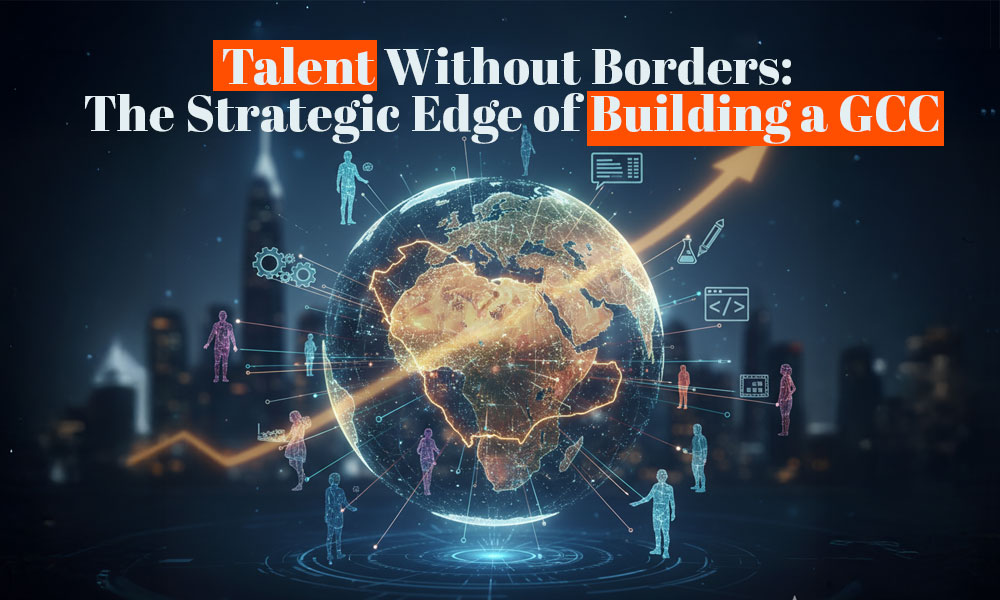A global capability centre (GCC) is an offshore or nearshore unit that supports an organization’s core business functions—from research and development (R&D) and information technology (IT) to analytics and finance—rather than functioning as isolated service providers.
Global capability center operating models are fully integrated and align with the organizations’ long-term goals, functioning as an in-house department, thereby distinguishing themselves from traditional offshoring or business process outsourcing (BPOs) offices, that primarily focus on cost-cutting and typically serve multiple clients.
The Rise of Indian Global Capability Centres

Global capability centres primarily came up to fill the operational gaps left by BPOs, in that they evolved into strategic centres delivering high-value services like R&D, data analytics, product development, and digital transformation, too, apart from the repetitive, manual tasks like data entry that BPOs, in outsourcing hotspots like India and the Philippines, were mainly developed to take care of.
This shift is driven by the need for agility, innovation, and access to global talent, especially in a post-pandemic world where distributed teams and remote collaboration have become the norm, and India, the favorite BPO destination for multinational companies (MNCs), has established itself as the undisputed leader in the global capability center landscape too.
Indian cities like Bengaluru, Hyderabad, Pune, and Gurgaon have evolved into global capability center advisory firm hubs, hosting over 1500 GCCs for Fortune 500 companies across sectors—tech, finance, healthcare, retail, and more—by offering deep technical expertise, a large and diverse talent pool, cost efficiency, and a maturing digital ecosystem, along with global capability center planning and execution services.
The Strategic Value of Global Talent Pools
Geographic diversity within global talent pools brings significant strategic advantages to organizations, like in the case of global capability centers in India, empowering organizations to move beyond local talent limitations, driving innovation and productivity.
- Enriches problem-solving: by combining varied cultural perspectives, experiences, and approaches, leading to more innovative and inclusive solutions.
- Accelerates time to market: by enabling parallel work across time zones—teams in different regions can develop, test, and iterate products around the clock.
- 24/7 global capability center strategies: ensure round the clock business continuity, allowing for real-time support, faster issue resolution, and uninterrupted operations.
Accessing global talent means tapping into specialized skill sets, diverse perspectives, and scalable workforces—leveraging which is easy through global capability center companies, allowing companies to not only expand access to talent but also build more agile, resilient, and globally competitive teams and business models.
Top 4 Benefits of Global Capability Centers
- High Value Operations- One of the most attractive benefits of a GCC model is that it streamlines operations by breaking down work and delegating it to specialized wings or arms withing an organization, like Global Capability Center Advice India or India Global Capability Center Consulting, which work on delivering high-quality, high value work like, in this case, advisory and strategic for digital transformation, instead of just manual and repetitive data entry.
- Cost-effectiveness- The second characteristic of the GCC model follows from the first, in that it delivers this level and volume of core capabilities, while still being cost-efficient, as it taps into a global talent pool-perhaps the biggest advantage of setting up operations in India.
- Cultural Integration- Perhaps a global capability center challenge, cultural integration can be achieved consistently just by devising and implementing transparent and inclusive onboarding practices, resulting in more coherent collaboration at all operational levels.
- Legal, Compliance & Data Security- Last but not least, global capability center services must navigate legal, risk management, regulatory compliance, intellectual property, data protection, and cybersecurity practices effectively for 360-degree business continuity.
Case Study of Walmart’s India Global Capability Center
Walmart, the world’s largest retailer, operates in a highly competitive and digitally driven retail environment, where regular enhancement of its global technology capabilities is imperative. So, to support its digital transformation goals, Walmart established its Global Capability Centre in India, now known as Walmart Global Tech India.
Challenges:
- Need for faster digital innovation across supply chain and e-commerce platforms
- High dependency on U.S.-based talent and limited tech bandwidth
- Rising costs and slower innovation cycles in onshore teams
GCC Strategy & Operating Model:
- Location: Indian tech cities of Bangalore and Chennai selected for access to tech talent and innovation ecosystem
- Talent: Hired 5,000+ engineers and data scientists across cloud, AI/ML, cybersecurity, and DevOps
- Integration: GCC teams work on core platforms like Walmart.com, supply chain tech, and customer analytics
- Governance: High alignment with U.S. HQ, with local leadership driving local execution and decision-making
- Innovation Focus: Developed data-driven solutions for last-mile delivery, inventory optimization, and omnichannel retail
Outcomes:
- Reduced time-to-market for new tech features by 30%
- Enabled 24/7 development cycles with global follow-the-sun model
- Elevated the GCC to a strategic innovation hub, not just a support center
- Recognized as a global center for AI and digital commerce innovation
The Future of Talent is Borderless
Just like most things in life, business and organizational models are cyclical and adaptable- meaning, old strategies which were declared redundant once can come back in upgraded versions with characteristics of other models to fit a new situation.
Enter, global capability centres which function like in-house departments, in that they are fully owned by a company, without incurring the cost of units within headquarters filled with local talent.
Global capabilities centers are predicted to evolve into more end-to-end ownership of products, fostering AI-driven operations, and play a leading role in enterprise innovation, resulting in cross-border leadership development, robust technology infrastructure, and a globally inclusive culture.



